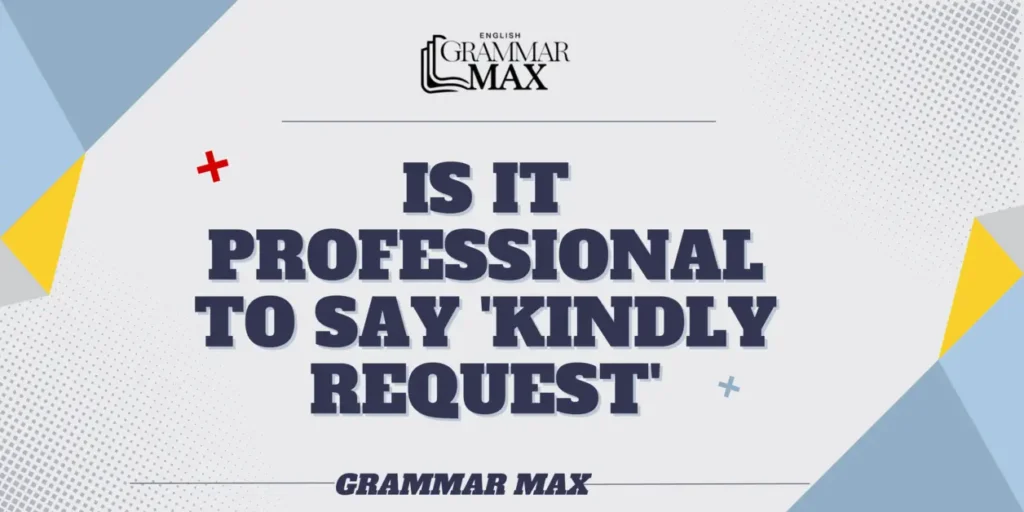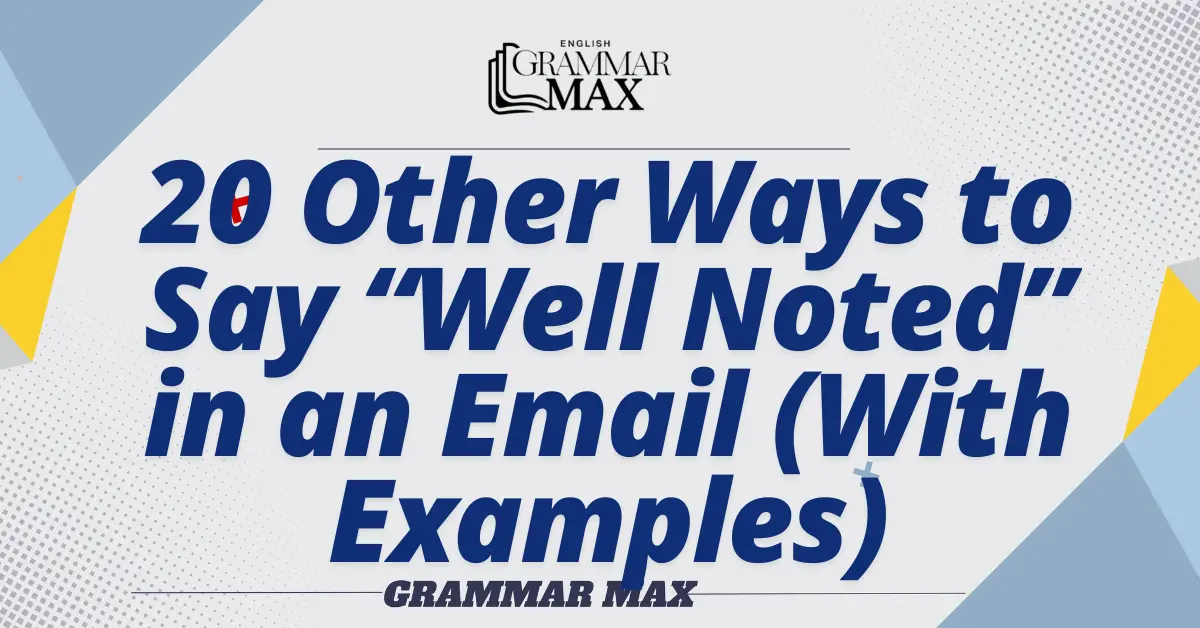Kindly Request is a phrase often used in professional communication to politely ask for something. While effective, relying on this exact phrase repeatedly can feel redundant. Exploring alternatives can help convey a polite request in diverse ways, adding nuance and respect to interactions, whether in business emails, formal letters, or team discussions.
We’ll review 20 professional synonyms and alternatives to “kindly request.” These variations, like professional request and courteous appeal, provide clear, respectful language suited to different scenarios, ensuring your message remains courteous and effective. Use these alternatives to express requests with clarity, deference, and professionalism.
Alternative ways to say “Kindly Request”

You can use these ways instead to say “Kindly Request”:
- Would Appreciate It
- Could You Please
- We Would Be Grateful
- I Humbly Request
- May I Kindly Request
- Respectfully Ask
- Would Be Beneficial
- Please Be So Kind
- We Kindly Urge
- We Encourage You
- Prompt Attention
- Polite Entreaty
- Would You Mind
- We Appreciate
- Humbly Ask
- May I Appeal
- Courteous Request
- Advantageous Proposal
- Kindly
- Immediate Response
Would Appreciate It
Using “would appreciate it” is a professional, polite way to make a request that suggests the recipient’s actions will be valued. It works well in situations where you want to emphasize the importance of the request without sounding too demanding.
For instance, saying, “we would appreciate it” if someone could complete a task gently conveys the significance while showing respect. This phrase strikes a balance between professionalism and warmth, making it ideal for a polite request.
Best Use:
“We would appreciate it if you could review the proposal by Wednesday. Your insights are invaluable and would ensure we meet our project goals.”
Example:
“Dear Alice, we would appreciate it if you could submit the quarterly report by Friday. Your insights have been invaluable, and this will help us meet our upcoming deadlines. Thank you!”
Could You Please
“Could you please” is a straightforward, respectful way to ask for help or a favor. This phrase is commonly used in professional communication, as it maintains a polite tone while ensuring clarity in the request.
By including “please,” the phrase underscores courtesy and leaves room for the recipient to respond thoughtfully. “Could you please” is effective for situations where you want to encourage prompt, yet friendly, cooperation.
Best Use:
“Could you please send the updated contract details? We need the latest information to proceed with the next steps efficiently.”
Example:
“Hi John, could you please review the attached document and share your thoughts? Your feedback is essential for the team’s project success.”
We Would Be Grateful
Saying “we would be grateful” conveys appreciation for any support or action provided. It’s an excellent way to show that you value the recipient’s time and effort, particularly for requests that may require additional attention.
This phrase emphasizes gratitude in advance, which can make the recipient more inclined to respond positively. Using “we would be grateful” is suitable for formal requests that involve collaborative input or extended efforts.
Best Use:
“We would be grateful if you could provide feedback on the recent meeting notes. Your input will help us refine our strategy.”
Example:
“Dear Mark, we would be grateful if you could provide an update on the project status by Wednesday. It will help us align our next steps accordingly.”
I Humbly Request
“I humbly request” is a deferential phrase often used in formal settings where extra respect is desired. It suggests the speaker is asking with sincere respect, making it ideal for sensitive topics or hierarchical relationships.
This phrase projects a humble tone while making it clear that the request is important. Using “I humbly request” can add weight to formal communications, particularly in correspondence with senior team members.
Best Use:
“I humbly request a moment of your time to discuss the quarterly performance review. Your guidance is essential for aligning our objectives.”
Example:
“Dear Ms. Thompson, I humbly request that you review my proposal at your earliest convenience. Your approval is essential for the project’s launch phase.”
May I Kindly Request
“May I kindly request” is a formal, courteous way to seek assistance or input. This phrase works well in professional emails where politeness is crucial, especially when reaching out to new contacts or senior colleagues.
It emphasizes courtesy and respect while positioning the request as one that deserves thoughtful consideration. “May I kindly request” can soften the ask, making it appear as a polite entreaty rather than an obligation.
Best Use:
“May I kindly request a follow-up meeting to go over the project revisions? Your expertise would help us address critical areas.”
Example:
“Dear Mr. Brown, may I kindly request a meeting to discuss the upcoming merger details? Your insights would be highly valued in finalizing our approach.”
Is it Professional to Say: Kindly Request?

Using “Kindly Request” can be seen as professional because it conveys respect and politeness in formal communication. However, it can sometimes feel overly formal or old-fashioned, depending on the context.
In work settings that value courteous language, “Kindly Request” fits well, especially when addressing authority figures or clients. On the other hand, in more casual professional settings, it may seem too stiff or even out of place. Choosing to use it depends on the tone of the organization and your relationship with the recipient.
Pros
- Shows respect and politeness in formal settings.
- Conveys seriousness and importance to the request.
Cons
- May feel overly formal or old-fashioned to some.
- Can seem stiff or out of place in casual settings.
What does “Kindly Request” mean?
“Kindly Request” means asking for something in a polite, respectful manner, commonly used in formal communication. It conveys a sense of deference, making the request feel courteous and considerate. This phrase is often used in emails, letters, or official documents where a professional tone is essential.
Frequently Asked Questions
Is it correct to say I kindly request?
Yes, “I kindly request” is grammatically correct and often used in formal writing, especially when making polite or respectful requests.
What is another way to say kindly request?
Alternatives include “would appreciate it,” “could you please,” or “may I ask,” which convey politeness in professional settings.
How can I request politely?
To request politely, use phrases like “would you mind,” “if you could,” or “we would be grateful,” which show respect and consideration.
How to use kindly in a sentence request?
Use “kindly” to add politeness, as in, “Could you kindly send the report?” or “We kindly ask for your prompt reply.”
Conclusion
Using varied and professional request phrases keeps your communication respectful and engaging. Experimenting with alternatives to “kindly request” can add depth and a unique tone to your requests, making them feel considerate and impactful.
Each of these kindly request alternatives serves as a versatile tool for creating meaningful connections in professional settings. When used appropriately, they help ensure that requests are well-received, fostering an environment of mutual respect and effective collaboration.

William Henry is a writer for Grammar Max, a blog that focuses on synonyms and phrases. He loves exploring the quirks of the English language and enjoys helping readers improve their vocabulary. William’s articles are easy to read, fun, and full of useful tips for anyone looking to better understand and use English. Whether you’re a student, a professional, or just someone interested in language, William’s writing on Grammar Max makes learning about words and their meanings simple and enjoyable.





